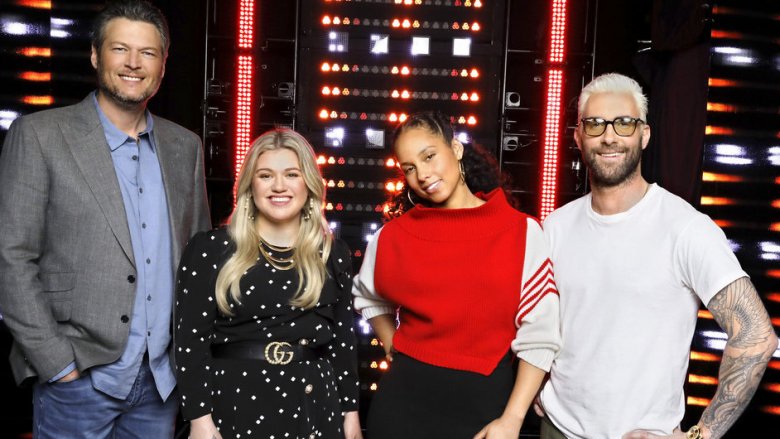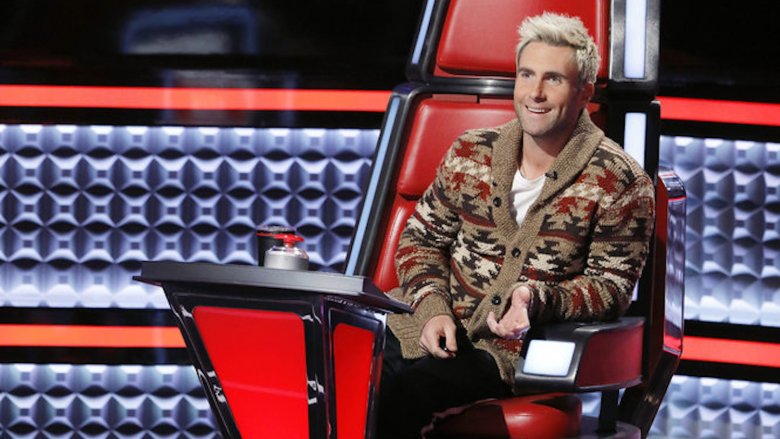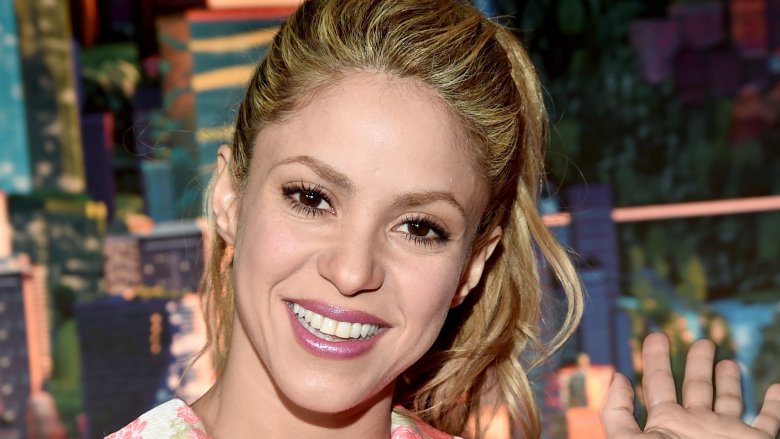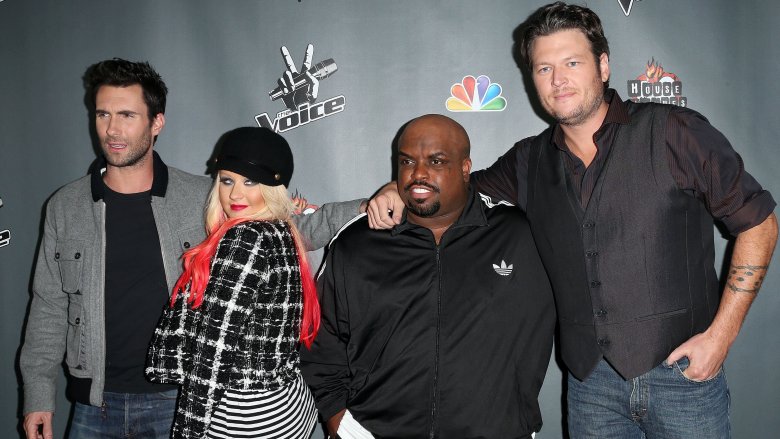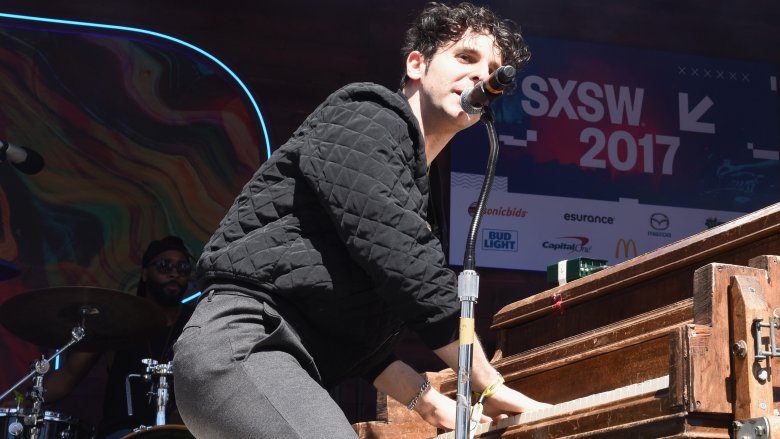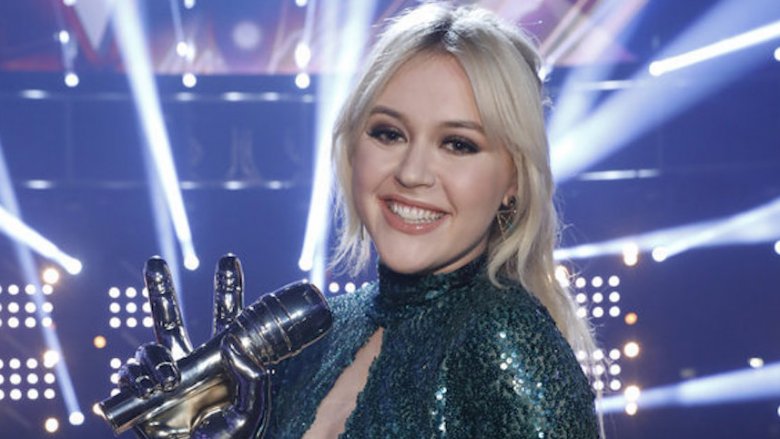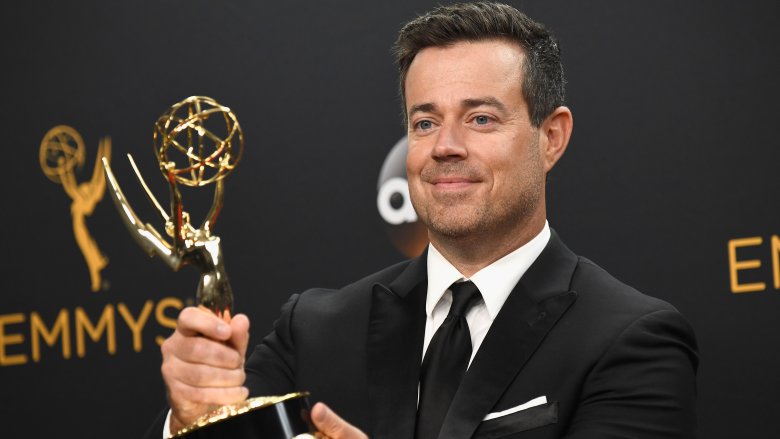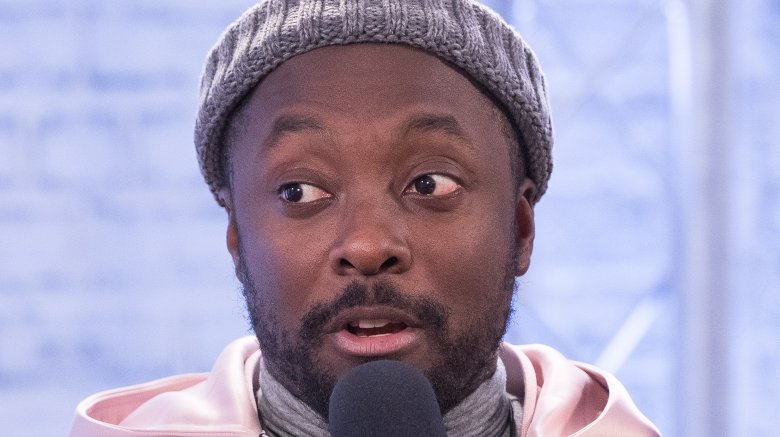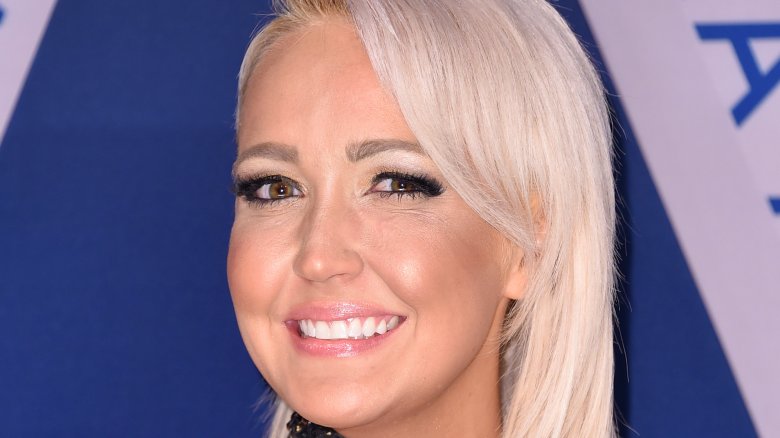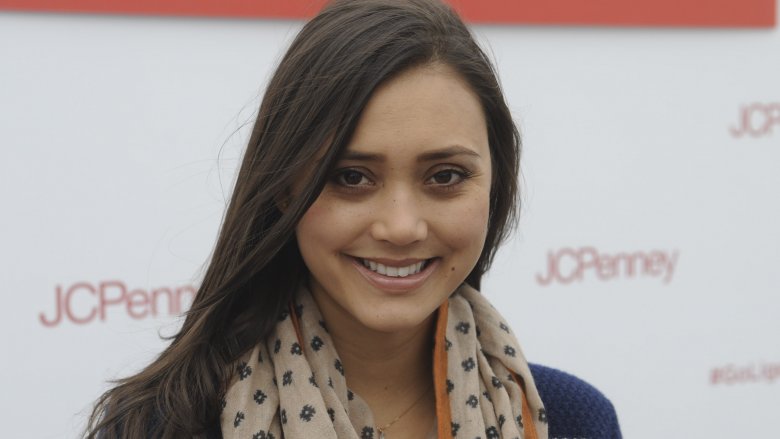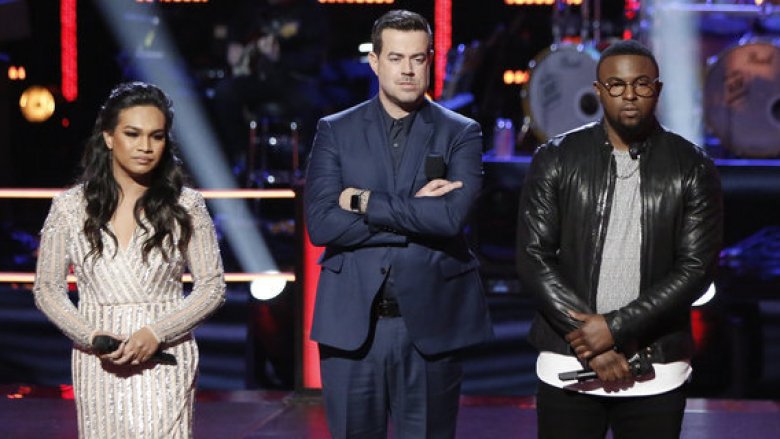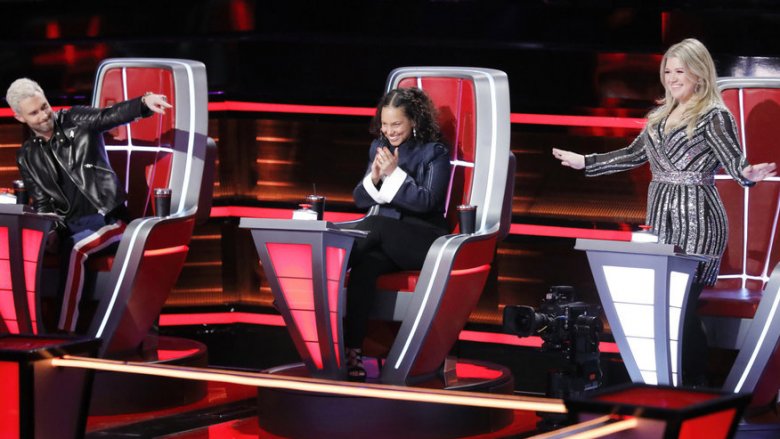Reasons Why The Voice Is Totally Fake
Does it ever feel like something's a little bit "off" about The Voice? (And no, we're not talking about some of the singing.) The competition presents itself as a magical dream factory that can turn a musician's wildest fantasies into reality ... but it rarely, if ever, delivers on that promise. How many former contestants can you name that have found true success? How many former contestants can you name at all? At the end of the day, doesn't the whole enterprise feel staged, particularly when you start piecing together all those nagging little details that just don't add up?
People in search of a genuine singing competition may want to look elsewhere. Sure, The Voice makes for massively entertaining television, and it's a huge hit for NBC. So is Chicago Fire, but that doesn't make it real or authentic in any way. From the way producers treat contestants (and shape their "life stories") to the manipulative format of the program, the reality of this reality competition is quite clear: The show is faker than fake, and adding a Block Button ain't going to change that.
Here's everything you need to know before you #VoiceSave another contestant.
Too many contestants 'could win this whole thing'
Adam Levine has a history of getting contestants' hopes up with his special six-word mantra.
"You could win this whole thing," he told Amy Vachal back in 2015. In 2014, he told contestant Delvin Choice, "There is no doubt in my mind that you could win this whole thing." In 2017, he also told then-16-year-old Anatalia Villaranda: "I do think you could win this whole thing." And after her performance of "Should've Been Us," Levine told Abby Celso – you guessed it — "I think you could win this whole thing."
But there's more. A lot more. In 2012, Levine heard Whitney Meyer belt out Alicia Keys' "No One" and surmised: "You can win this whole thing." Just like he told Josh Kaufman he "could win this whole thing" and told Sarah Simmons she "could win this whole thing." If Levine has any say in the matter, you probably have an excellent chance of winning this whole thing, too.
Well, audiences have caught on, and so has the media. In a 2017 takedown of The Voice published in The Atlantic, journalist Julie Beck wrote, "...contestants don't necessarily realize that [Levine's] diluting that statement through endless repetition." In fact, none of the performers listed above won the competition, which proves Levine's catchphrase is just so much hot air.
There is one outlier worthy of mention: In 2015, Levine told Jeffrey Austin, "You really could win this whole thing." Miraculously enough, Austin won!
Accidents will happen.
All that coaching is strictly for the cameras
With only so many hours in the day, how do all these superstars with well-established careers, album deadlines, and hectic touring schedules manage to block out chunks of time to coax scrappy Voice contestants into life-changing performances? Here's a theory: They don't. At least, not to the extent the show's frantic editing would lead you to believe.
Just ask Ddendyl Hoyt. During an interview with The Washington Post, the Season 6 contestant said her Voice mentor wasn't quite as hands-on as TV viewers were led to believe. They don't televise "all the coaching that comes from the staff," Hoyt said. "The vocal coaches, the band director, the producers — everyone has notes for you." Ultimately, audiences only see a minuscule part of the process.
Though Hoyt was "Team Shakira," she claims she only met with the Latin pop princess for taped portions of the show. Otherwise, for her and the other contestants, "the majority of our growth was left to us on our own," she said.
Tough love — or fake love? We leave that to you.
Judges allegedly hate each other off-camera
If rumors are to be believed, the friendly banter we see in every episode is just for the cameras. In fact, Adam Levine reportedly had a long-running feud with former judge Christina Aguilera, and rumor has it Aguilera quit the show over an alleged beef with Gwen Stefani.
There are multiple reports that Levine was often at odds with judge Miley Cyrus, too. You wouldn't know it from watching, but a source told Us Weekly the two "totally butted heads" on multiple occasions. According to the tabloid's sources, Cyrus and Levine were just too similar to get along: "They both have short attention spans," the insider said. "They find each other annoying. Adam would get agitated when Miley would interrupt him, and she enjoyed getting under his skin." Could that have anything to do with why she's no longer on the show?
According to Radar Online, Blake Shelton and Jennifer Hudson battled as much behind the scenes as on the show during Season 13. A source swore that "Blake straight-up told Jennifer that she is an entitled b***h and that he's never worked with someone so difficult to be around." The same article reported the judges were upset with Hudson for throwing shoes and books at contestants, despite her claim that it's all in the name of love.
Guess all those beaming million-dollar smiles are capital-F fake.
Insiders claim the show is 'precast'
Despite the fact that The Voice pulls in millions of viewers, one popular musician has zero interest in becoming a cog in that particular machine. Adam Weiner (pictured), frontman for popular Philadelphia-based band Low Cut Connie, was appalled when producers asked if he'd like to join the show in 2015. Since another contestant had dropped out at the last minute, producers wanted to "fast track" him onto the season. "No audition," he told Philadelphia, adding that a producer told him: "We've seen what you do. We've seen what we need to see."
Weiner ultimately declined, confident the show would bury his career. "None of the people who have won that show have had any real career after," he told the magazine. Oh, and all the "blind auditions?" Forget 'em. In a Facebook post, Weiner alleges, "The Voice is entirely 'precast.'" He claims producers started micromanaging before he'd even signed on, telling him what kind of material he could and couldn't perform. Had he participated, Weiner claims he would have been forced to "do a lot of modern pop songs, songs that they were essentially promoting on the show."
This musician's account adds considerable heft to those long-held suspicions that The Voice is compulsively pre-planned and precast ... a long-toothed way of saying this show is faaaake.
And on that note...
Winner Chloe Kohanski never even auditioned
An interview with Season 13 winner Chloe Kohanski sheds light on a pesky fact that isn't made altogether clear to viewers: Not everybody auditions for The Voice.
In 2017, Kohanski sang Fleetwood Mac's "The Chain" during her so-called blind audition. Her performance was a rousing success, but she had something of an advantage over her peers. "This is going to sound crazy, but I didn't audition for the show," she told Parade shortly after winning. Kohanski claimed there are countless ways to "get involved" with The Voice, and her entry point was via a mysterious and glamorous phone call.
"Someone saw me at a show," she revealed, "and they got my contact info and called and they were like, 'Do you want to audition for The Voice? We will fly you out.'" And they did.
If producers are sweetening the pot by hand-selecting some competitors (perhaps to ensure a degree of quality control) that means people aren't starting out on equal footing. It makes for a more dramatic viewing experience, sure, but isn't that rather misleading at the end of the day?
The show is more interested in creating great TV than launching careers
The Voice hasn't had a problem collecting Emmys. It scored its third consecutive award in the reality competition series category in 2017, but contestants have failed to match that success in the charts.
Since 2011, the show's winners have only produced five original Top 40 songs, and only one Grammy nod: Season 3's Cassadee Pope was nominated for her Chris Young duet "Think of You" in the best country duo/group performance category in 2017, but she lost to Pentatonix/Dolly Parton's "Jolene" update. As Billboard noted in 2014, the show's winners tend to vanish "like loved ones on The Leftovers."
Unsurprisingly, the show's key players get a tad defensive when this is addressed. Asked during a 2013 press tour why the show hasn't been able to create a major star, Levine said, "I don't know if that's the overall mission statement of the show." Host Carson Daly takes it even further: "We didn't really create the show to create a celebrity musician or make people rich and famous," he said.
So what is the goal of the show? "So many of the artists who have been on The Voice in any capacity have quit their sandwich-making jobs and are doing well in music," Daly told The Huffington Post in 2017. "And, at the end of the day, that's winning to us."
We're not sure too many other people would define "winning" as "not making sandwiches." Is that a thing now?
One judge admits winning isn't about your voice
You can sing your little heart out, but unless producers have helped you concoct a killer backstory, there's little chance you'll make it far on The Voice. That's according to musician, producer, and Black Eyed Peas founder will.i.am, who is happy to explain what he finds deceptive about the show's format.
Speaking to News Corp's Switched On in 2014, the longtime judge on The Voice UK (who also had a stint on The Voice Australia for its 2014 season) noted that very few competitors wind up forging a lasting career after the show. "It's typical TV," he said. "It isn't really the best voice that wins, even though the show is called The Voice ... The people always vote via emotions."
Breaking down the reality show's shortcomings even further, he added: "There is something sentimental, tugging on emotion, or people gravitate to that [artist's] personality that factors in on why someone wins."
What's more, he thinks Voice participants are too polite and eager to please to ever become genuine stars. To make it big in the entertainment industry, "You have to be a predator," he told Express in 2018, "and predators aren't polite."
The competition is often flat-out unfair
A fair competition means a level playing field, but by design, The Voice sacrifices fairness in favor of drama and maximum watchability. As The Washington Post opined, "People with lots of show business experience have an unfair advantage" on the show, which often pairs up young, wide-eyed newbies with entertainers who have plenty of illustrious musical achievements under their belts.
Case in point: During a Blake Shelton battle, 14-year-old Brennley Brown was teamed up with Lauren Duski, a 25-year-old who has opened for countless country acts, including Lonestar, Randy Travis, Confederate Railroad, and Bill Anderson. Similarly, Twitter went into overdrive when Meghan Linsey placed second in 2015, since she was previously part of Steel Magnolia, a popular country duo that won the CMT competition show with Can You Duet? in 2009.
Wouldn't a genuine singing competition involve performers who are more-or-less at the same skill level? It might not make for quite as riveting TV, but it would at least be authentic.
Former contestants admit producers shape their backstory
According to at least one former contestant, producers aren't above carefully shaping participants' backstories to make for gripping, heart-tugging television. Rather than depict contestants in an honest light, producers will pick and choose details from testimonials and then amplify them for peak pathos.
Dia Frampton, a runner-up in Season 1, wound up being portrayed as a children's book author, "which was something I very lightly touched upon when we were doing interviews," she told The Huffington Post in 2017. She claims it was "interesting" to "have that narrative chosen for me." We bet it was!
Frampton claimed she only wanted to appear on The Voice to hype her band, Meg & Dia, but producers wound up omitting the fact that she already had a music project she was passionate about. "The band was never mentioned," she said. "I mean, I mentioned it, but it was never put on the show."
Makes you wonder what other aspects of the show are manipulated by producers, doesn't it? Well, a leaked legal document sheds plenty of light on some other shady machinations, and they're pretty darn hardcore...
A leaked Voice contract says NBC can ignore votes
You know what must have been an awkward afternoon at The Voice? The day the New York Daily News got its hands on a 32-page contract that shed light on just how lenient NBC execs can be with your votes.
For one thing, producers can allegedly ignore them completely. They can also reportedly switch up the rules whenever they want, or eliminate contestants on a whim — even if those contestants happen to be "winning" in the eyes of the public. According to the documents, each participant must take intensive psychological and medical tests as part of the audition process, and they have to be okay with those test results being broadcast on television. What's more, NBC can totally shrug off The Voice's voting system, despite the fact (or perhaps because of the fact) that the system is inextricably tied to revenue earned from contestants' music on iTunes.
Tellingly, contestants must agree to let the powers-that-be portray them in a light that "may be disparaging, defamatory, embarrassing (and) may expose [them] to public ridicule, humiliation or condemnation." In fact, participants must agree to let producers "portray [them] in a false light." It doesn't get much faker than that.
As a scrappy legal expect told the paper, "The second clause of this document says to contestants, 'F**k you. And if you missed it, the clauses that follow say, 'F**k you.'" Not exactly legalese, is it?
The show was accused of stealing musical arrangements
Battle of the Dueling "Creep" Covers is one reality competition we never expected to see, but after Kimberly Nichole performed her admittedly brilliant cover of Radiohead's 1993 "Creep," that's pretty much what we got. Following Nichole's show-stopping turn, a few fans of the show were unsettled: Hadn't they heard that particularly musical arrangement somewhere before?
Well, yes, they had. Or at least an arrangement that's very, very similar. Not long after the performance, a handful of intrepid Voice viewers pointed out the rather striking resemblance to a cover of "Creep" performed by Postmodern Jukebox (with American Idol runner-up Haley Reinhart) in 2004. In fact, some of the more uppity Postmodern Jukebox fans even accused The Voice of flat-out stealing the arrangement.
Nichole was unfazed by the brouhaha: "I mean, child, that was controversy over nothing," she told TV Line in 2015. "People were talking about how I was a thief. I was like, 'What?"
We admit it might seem like nitpicking to get up in arms about the arrangement of a cover, but isn't it only fair that the original cover artist (which isn't an oxymoron, we swear) get some sort of shout-out for their efforts?
Contestants are the least important people on the show
Though no longer the smash it was upon its 2011 debut, The Voice continues raking in respectable numbers: In February 2018, 12.3 million people tuned in for the Season 14 premiere, but were they coming back to check out the contestants or to critique Adam Levine's hair?
Whether it's the Maroon 5 frontman's contract negotiations or Kelly Clarkson and Blake Shelton's battle over country contestants, it's the judges who ultimately dominate headlines, and they remain the central draw of the show. After 14 seasons, we still have a show that purports to be about finding "the voice" when it's really about advancing the fame and fortune of performers who already have both.
According to Billboard, "the show's greatest use" has been "taking established artists and making them bigger — much bigger." So viewer beware: while the show manipulates you week after week, luring you in with contestants' sob stories (many of which are trumped up,) all these bright-eyed hopefuls will eventually be thrown into the trash heap to make room for the next batch of suckers. Will you remember their names? Nope — but you'll lie awake at night wondering whether Blake and Kelly managed to put their differences behind them after that alleged "explosive backstage feud."
The Voice is great news for Levine and Co., and it remains a white-hot ticket for NBC, but it's bad news for anyone yearning for an authentic singing competition.

